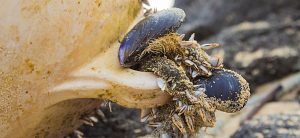Researchers in the COMPLETE project have published an article that explores the management question related to the biofouling of ships’ underwater structures through qualitative decision analysis. The article recently came out in Marine Pollution Bulletin.
Biofouling management is important to prevent the spread of harmful non-indigenous species, but also from the viewpoint of the fuel economy and CO2 emissions of ships. The attachment and growth of organisms can be prevented by regular cleaning of the underwater parts of vessels and by applying various antifouling or foul-release coatings. However, there are risks associated with the methods and their combinations, that should be considered when making choices.
In their recent article, the researchers clarify the multifaceted and cross-disciplinary nature of the biofouling management decisions. To support readers’ thinking, the problem is visualized as a causal conceptual map (qualitative influence diagram). The article explains how ship- and route-specific factors, as well as the physico-chemical conditions in the Baltic Sea, affect the case-specifically optimal choices. The control options are viewed in a multi-objective manner, from the perspectives of shipping companies’ fuel and biofouling management costs, CO2 emissions and the risks to the Baltic Sea ecosystem.
The article is part of KMRC-researcher Emilia Luoma’s PhD study in the research group of the University of Helsinki. In her thesis, Luoma applies participatory system modeling methods to examine environmental and sustainability issues related to marine traffic in the Baltic Sea.


